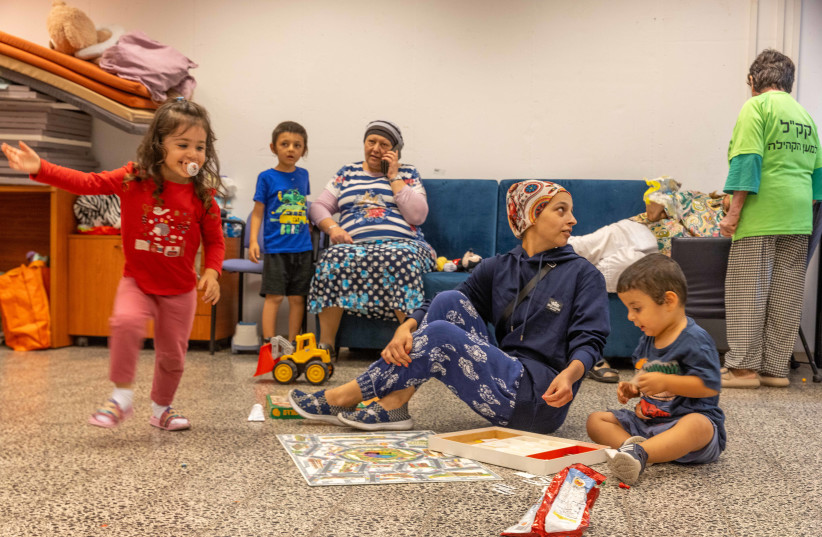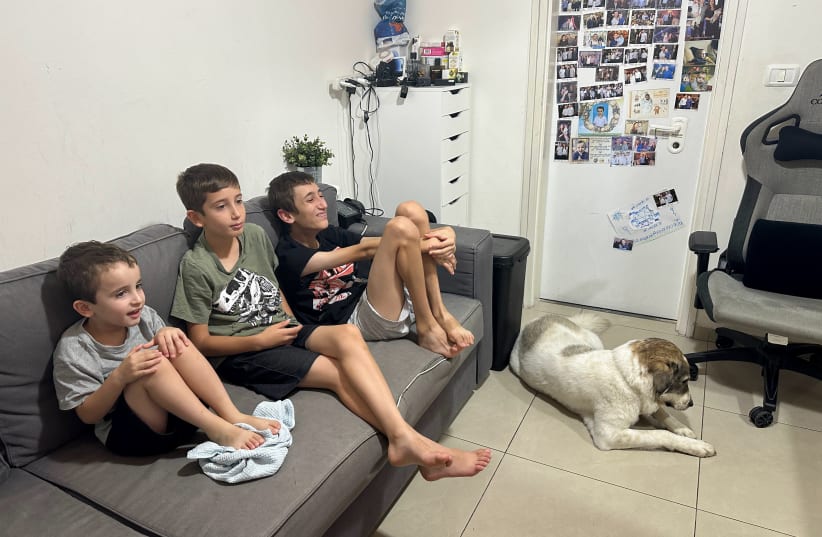This article was reported and written by a graduate of JTA’s Teen Journalism Fellowship, a program that works with Jewish teens around the world to report on issues that affect their lives.
Around 6:30 a.m. on Oct. 7, Nir, a 16-year-old from the southern Israeli city of Ashkelon, woke to the sound of alarms outside her window, alerting her of oncoming rockets. Her city was being attacked by bombs and rockets. She was overwhelmed by panic and the smell of fire.
Not long after, all electricity cut off in her city, leaving her and her family without access to their television, the internet and their building’s elevator. Along with her parents, sister and dog, she went to their apartment’s safe room and then evacuated to their building’s general shelter.
“We heard a boom from nowhere and with that, the rocket was hitting our building,” said Nir, who is now staying with her cousins in Petah Tikva, a city outside of Tel Aviv. (Later, she learned the missile hit in front of their building.) “I freaked out. I was very panicked. I didn’t know how to react. I was shocked.”
Ever since, Nir, who requested anonymity out of safety concerns, said she gets nauseated and nervous every time she hears the sound of alarms or rockets. “I had a panic attack on Saturday, and now I’m in a better place, but I’m still nervous from everything,” she said. “Every step, every little noise I hear I get nervous from out of nowhere.”


One of many
Nir is one of many Israeli teens JTA talked to who are struggling with their mental health since the war began. At least 1,300 Israelis, mostly civilians, were killed when Hamas invaded that Saturday morning; 150 are missing and presumed taken captive. With the future unknown and with the memories of previous attacks, Israeli teens are fighting their own battles.
Eliyah Hajjaj, a 15-year-old from Beersheba, a city 30 miles west of Gaza, struggles to sleep since the attacks. “I can never calm down,” he said. “I’m sleeping just three hours a day. Every time I have nightmares. I am really scared.”
For teens like Nevo, who lives about three miles from the Gaza border beyond which Hamas regularly launches missile barrages, rockets are nothing new.
“Ever since I can remember, it was like this,” the 16-year-old said. (Nevo requested his last name and town name not be shared out of concerns over social media harassment.) He knew this time was different once his WhatsApp group chats started mentioning the presence of Hamas terrorists on Israeli soil.
Those terrorists tried to enter his town but were killed before they could, his parents explained.
While Nevo and his family remain physically unharmed, he knows teenagers and adults in his community who have been killed. “They came to kill citizens, to kill my friends, to kill me. They came to murder me,” said Nevo. “In my worst nightmares, I did not imagine this situation happening.”
As a child, Nevo had nightmares that terrorists would invade his town and he would need to be the hero. “But this time, I couldn’t be the hero. I was sitting in silence.”
Days after the beginning of this war, Nevo continues to struggle mentally. Activities Nevo used to enjoy like scrolling on Instagram have turned somber as his social media feeds fill with horrifying images of violence and tragic reports of the dead and missing. Doing his homework is also a struggle as he cannot stop thinking about the recent tragedies.
Schools, meanwhile, were closed after the attacks, and were only to open gradually this week.
In an effort to cope, Nevo is helping those in his community. He cooks meals for families in need and plays with neighborhood children to help them stay distracted.
Further north, Tel Aviv teenagers Bar Mandel and Jessica Nasach have also turned to volunteering.
While Tel Aviv was out of range from the worst of Hamas’ attacks, many of its residents were forced into shelters through the first few days of the assault while its normally lively streets turned quiet. To stay occupied, many of its young citizens are eager to find ways they can help the cause. Rather than waiting for news at home all day, Bar, Nasach and several other Tel Aviv teens and adults have been cooking meals for IDF soldiers and others in need. The group volunteers at Shuk Tzafon, a popular Israeli market filled with restaurants that offer their kitchens to help make hot meals for soldiers.
Volunteering “really helped me a lot, because then I don’t feel helpless. When I’m sitting at home, I feel like I’m just waiting for something bad to happen. I feel awful when I’m just sitting and doing nothing,” said Mandel.
So far, Mandel estimates that the group has made over 3,000 meals, with an average of about 800 a day. She and her group plan on continuing to prepare food on weekdays for the time being.
Nasach feels guilty for being in relative safety compared to those living in the South. “You feel guilty about the fact that you’re able to eat, sleep and others can’t do that,” the 16-year-old said. The volunteering lessons her guilt, but when she returns home, the cycle of emotions continues.
All the teens are waiting to wake from what feels like a walking nightmare. “We just want peace. We want to wake up in the morning at 6 a.m. and not hear alarms from nowhere and find out that there are people being kidnapped,” said Nir, the teen from Ashkelon. “We just want to be in a very safe place, a calm place.”
